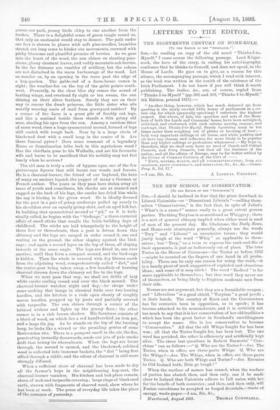THE NEW SCHOOL OF CONSERVATISM.
[To THE EDITOR OP THE " SPECTATOR."] SIR, —I should be inclined to fear that the great drawback to- Liberal Unionists—or "Dissentient Liberals "—calling them- selves "Conservatives," is the fact that, in spite of Juliet's. "What's in a name ?" names really to a great extent govern parties. The thing Toryism is as moribund as Whiggery ; there is a sort of general obloquy implied when either word is used of men of the present day. Mr. Gladstone, the Daily News, and Home-rule strategists generally, always use the words " Tory " and " Liberal " as correlative terms ; they would. justly laugh at the word " Whig " as applicable to them- selves ; but " Tory," as a term to express the rank-and-file of their opponents, is just as ludicrously out of place. The true Tories in the House of Commons—the Tories as before 1832' —might be counted on the fingers of one hand in all proba- bility. There can be only one reason for using the word,—it is a handy piece of mud, suggestive of exploded and obnoxious ideas ; and some of it may stick I The word "Radical " is far- more applicable to themselves ; but that word they never use of themselves, as being likely to frighten moderate men from their side.
Names are not argument, but they are a formidable weapon ; and " Liberalism " is a good shield, " Toryism " a good javelin in their hands. The country of Knox and the Covenanters has for centuries been in opposition, so to speak.; it has become attached to its nomenclature, and it is certainly not too much to say that it is her conservation of her old traditior which has been the great factor in Scotland's unwillingness to accept the name. She is too conservative to become " Conservative." All that the old Whigs fought for has been won ; all that the Tories fought for, has been lost. The one word has perished, the other is officiously and artificially kept alive. The three last questions in Robert Emmetts' " Cate- chism" run as follows :—" Q. Who are the Tories P—Ans. The Tories, when in office, are three-parts Whigs. Q. Who are the Whigs P—Ans. The Whigs, when in office, are three-parts Tories. Q. Who are both Whigs and Tories?—Ans. Enemies to Old Ireland both, Erin go bragh I " When the warfare of names has ceased, when the warfare of parties has abated, then, and then only, can it be made- clear to Ireland that Unionists adhere to full union with her for the benefit of both countries ; and then, and then only, will. Fenian catechisms be accepted as forged deoretals,—waste energy, waste-paper.—I am, Sir, &e.,


































 Previous page
Previous page